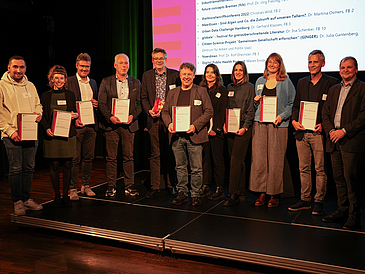The University of Bremen established the Outreach Award to recognize outstanding projects that bridge the gap between business, politics, and citizens with the academic community. This may include the application of academic learning in practical settings or the transfer of research findings to non-university contexts. Out of the 31 applications from all of the university’s faculties, ten were shortlisted.
The DENCAI project addresses a highly relevant and socially significant issue. A dengue diagnosis requires immediate investigation of its origin, such as location and circumstances, to combat existing mosquito populations. This is where the award-winning project comes in. In collaboration with partners at Mahidol University in Bangkok, DENCAI has developed a software for monitoring and combating dengue outbreaks.
Kathrin Moosdorf, Senator for Environment, Climate and Science of the City of Bremen, states, “Outreach activities make it possible for academic knowledge to have an impact. This is stated in the outreach strategy of the University of Bremen. The DENCAI project implements this strategy in an exemplary manner. With the DENCAI software, locals can actively prevent the spread of dengue infections. I am delighted that the university will now be regularly awarding the Outreach Award to draw attention to such solutions. I would also like to thank the Wolfgang Ritter Foundation and Sparkasse Bremen for financially supporting this important award.”
Professor Jutta Günther, President of the University of Bremen, emphasized the importance of outreach activities for society: “Knowledge and technology transfer from the university is extremely important for innovative developments and practical applications. This applies to technical as well as social and cultural developments. All these areas are in focus of the outreach activities of the University of Bremen. I am pleased that we can make this significant work more visible to the public with the Outreach Award.”
Professor Michal Kucera, Vice President for Research and Transfer at the University of Bremen, congratulated the award winners, “Today, more than half of the world’s population is already at risk of dengue fever. And as climate change continues unabated, this dangerous disease is spreading further into temperate latitudes. Solutions like DENCAI are therefore urgently needed.”
The Vice President thanked all the participants, “The jury’s decision was not easy as we received many high quality applications. The projects submitted ranged from German studies to biochemistry. They showed impressively how diverse and creative outreach can be. They all contribute to taking on social responsibility, which is one of the guiding principles of our university.
Software for Monitoring and Combating Dengue Outbreaks
The winning software improves and expedites the response to dengue outbreaks and potential sources of infection as it significantly speeds up the organization of disease combating activities. It consists of a web-based and mobile app and is used by Thai public health workers at various organizational levels, where it simplifies and accelerates the monitoring of dengue infections. At the same time, digital data is collected.
The jury was particularly impressed by the fact that the project is largely student driven. Computer science students from the University of Bremen and Mahidol University jointly developed the software.
Immediate Benefit for the Community
The award-winning software has already been put into practice. It was successfully used during the 2023 dengue season in a pilot phase that lasted several months. DENCAI is currently being further refined and the team is working to make the software known beyond the borders of Thailand so that as many people as possible will be able to benefit from it in the future.
Panel Discussion on the Future of Hydrogen
The importance of the dialogue between science and society also became clear during the panel discussion at the award ceremony. Representatives of the hyBit project, led by scientist Dr. Torben Stührmann, discussed energy and hydrogen transformation in the Bremen region. The hyBit project is developing a digital transformation platform to bring together energy transformation paths and potentials in Bremen in the areas of industry, logistics, and urban development.
According to Jutta Günther, the issue of hydrogen is a good example of what effective outreach activities look like, “The focus is on Bremen’s industrial port, in particular the ArcelorMittal steelworks, which is currently the largest emitter of carbon dioxide in our region with emissions of around six million tons. The hyBit project is highly application-oriented and makes a concrete contribution to the transformation of our urban society.”
The President thanked the Wolfgang Ritter Foundation and Sparkasse Bremen for their financial support.
Cooperation Partnerships:
Sparkasse Bremen
Wolfgang Ritter-Stiftung Bremen
hyBit_Hydrogen for Bremen’s industrial transformation https://hybit.org/en/
Further Information:
DENCAI – DENgue CAse Investigation: https://mobile4d-projekt.de/en/home-en/
Outreach activities at the University of Bremen: https://www.uni-bremen.de/en/cooperation
Contact:
Anne-Kathrin Guder
Administrative Unit 16, UniTransfer
Phone: + 49 421 218-60330
Email: anne-kathrin.guderprotect me ?!vw.uni-bremenprotect me ?!.de

